Protein in Pregnancy: Complete Trimester Guide

Does Your Baby's Brain Development Depend on That Chicken Curry You're Eating?
TL;DR - Pregnancy Protein Guide
• Protein requirements change by trimester: 46g (first), 71g (second & third)
• Key benefits: Supports fetal brain development, placental growth, maternal blood volume expansion, and reduces pre-eclampsia risk
• Best sources: Both vegetarian (dal, paneer, tofu) and non-vegetarian (chicken, fish, eggs) options provide complete nutrition
• Deficiency risks: Low birth weight, developmental delays, kidney problems, and long-term health impacts
• Track easily: Use NutriScan app to photograph meals and monitor daily protein intake without manual logging
Every expecting mother has asked this question at some point during pregnancy - am I eating enough protein? The answer matters more than most people realize. Protein isn't just another nutrient to check off the list. It's the building block that shapes every single cell in a growing baby's body, from tiny fingernails to complex brain structures.
Research shows that protein requirements change throughout pregnancy, and many women unknowingly consume less than what their body and baby need. Studies found that one in eight women during the second and third trimesters have inadequate protein intake. This isn't about eating more food - it's about eating smarter and understanding exactly what the body needs at each stage.
The journey through pregnancy brings unique nutritional challenges at every turn. Morning sickness in the first trimester, rapid growth spurts in the second, and space constraints in the third all affect how women eat and what they can tolerate. Understanding protein needs throughout this journey empowers women to make informed choices that benefit both themselves and their developing babies.
Meet Three Women, Three Different Protein Stories
Priya's First Trimester Challenge
Priya, a 28-year-old software engineer from Bengaluru, spent her first trimester battling severe morning sickness. The thought of chicken made her nauseous. Dal tasted metallic. Even her favorite paneer tikka seemed unappetizing. She survived on crackers and ginger tea, not realizing her protein intake had dropped to just 30 grams daily - well below the recommended 46 grams. Her energy levels plummeted, and she felt exhausted all the time.
When she finally mentioned her struggles to her doctor, they discussed strategies for getting protein through foods she could tolerate. Cold yogurt, fruit smoothies with nut butter, and small portions of khichdi became her lifesavers. Using the NutriScan app to photograph her meals helped her track intake without the stress of manual logging. By the end of the first trimester, she was consistently meeting her protein goals and feeling noticeably better.
 Finding creative ways to prepare protein-rich meals during pregnancy
Finding creative ways to prepare protein-rich meals during pregnancy
Meera's Second Trimester Discovery
Meera, a yoga instructor from Mumbai, felt great during her second trimester. She was vegetarian and ate healthy - or so she thought. A routine blood test revealed she was borderline anemic. Her doctor asked about her diet and discovered that while Meera ate plenty of vegetables and fruits, her protein intake was only 50 grams daily. She needed at least 71 grams to support her baby's rapid growth during this phase.
Her doctor explained that plant-based proteins needed to be combined strategically to provide complete amino acids. Meera started pairing dal with rice more consistently, adding paneer to her vegetables, and snacking on roasted chana throughout the day. She also began tracking her meals with NutriScan, which helped her visualize her daily protein intake. Within weeks, her energy improved, and follow-up tests showed better nutritional status.
Sarah's Third Trimester Adjustment
Sarah, an expat living in Singapore, entered her third trimester feeling confident about her nutrition. However, she noticed swelling in her legs and unusual fatigue. Her doctor explained that while she was eating enough calories, her protein distribution throughout the day was poor. She was loading up at dinner but skimping at breakfast and lunch. Her baby needed consistent protein supply throughout the day for optimal brain and organ development.
Sarah restructured her eating pattern, adding eggs to breakfast, Greek yogurt as morning snack, lean chicken to lunch, and maintaining a protein-rich dinner. She started using NutriScan's NutriBites feature to ask quick questions about protein sources and got instant answers without scheduling doctor appointments. This real-time guidance helped her adjust her diet precisely when she needed it most.
The Science Behind Protein and Pregnancy
Protein serves multiple critical functions during pregnancy. Think of it as the construction material for building a human being from scratch. Recent research shows that protein deposition increases throughout pregnancy, with most occurring during the third trimester.
During pregnancy, protein helps in:
Building Fetal Tissues: Every cell in the baby's body needs protein. From the brain to the heart, from muscles to skin, protein forms the basic structure. Research indicates that adequate protein intake is linked to healthier birth weights and proper organ development. The amino acids from dietary protein become the literal building blocks of the baby's growing body.
Supporting Placental Growth: The placenta, which connects mother to baby, requires significant protein for its development and function. A well-developed placenta ensures better nutrient transfer to the baby. The placenta itself weighs approximately one pound at term and consists primarily of protein-based tissues.
Expanding Blood Volume: A pregnant woman's blood volume increases by up to 60% during pregnancy. This expansion requires protein to produce hemoglobin and plasma proteins. Without adequate protein, this expansion can be compromised, potentially affecting oxygen delivery to the baby.
Preventing Complications: Studies link adequate protein intake with reduced risks of pre-eclampsia, a dangerous condition causing high blood pressure during pregnancy. Research found that protein supplementation in women with pre-eclampsia helped reduce blood pressure and improve fetal health. The relationship between protein and blood pressure regulation during pregnancy is now well-established.
Supporting Brain Development: The baby's brain develops rapidly, especially during the third trimester. Protein provides amino acids necessary for neurotransmitter production and brain cell formation. Research on maternal protein intake and child development revealed that severely low protein intake during early pregnancy was associated with developmental delays at age three. The brain's foundational architecture depends heavily on adequate maternal protein consumption.
Maintaining Maternal Health: Beyond the baby, protein helps pregnant women maintain muscle mass, supports immune function, helps wounds heal (important for delivery), and keeps energy levels stable. Mothers need protein for their own health, not just for the baby.
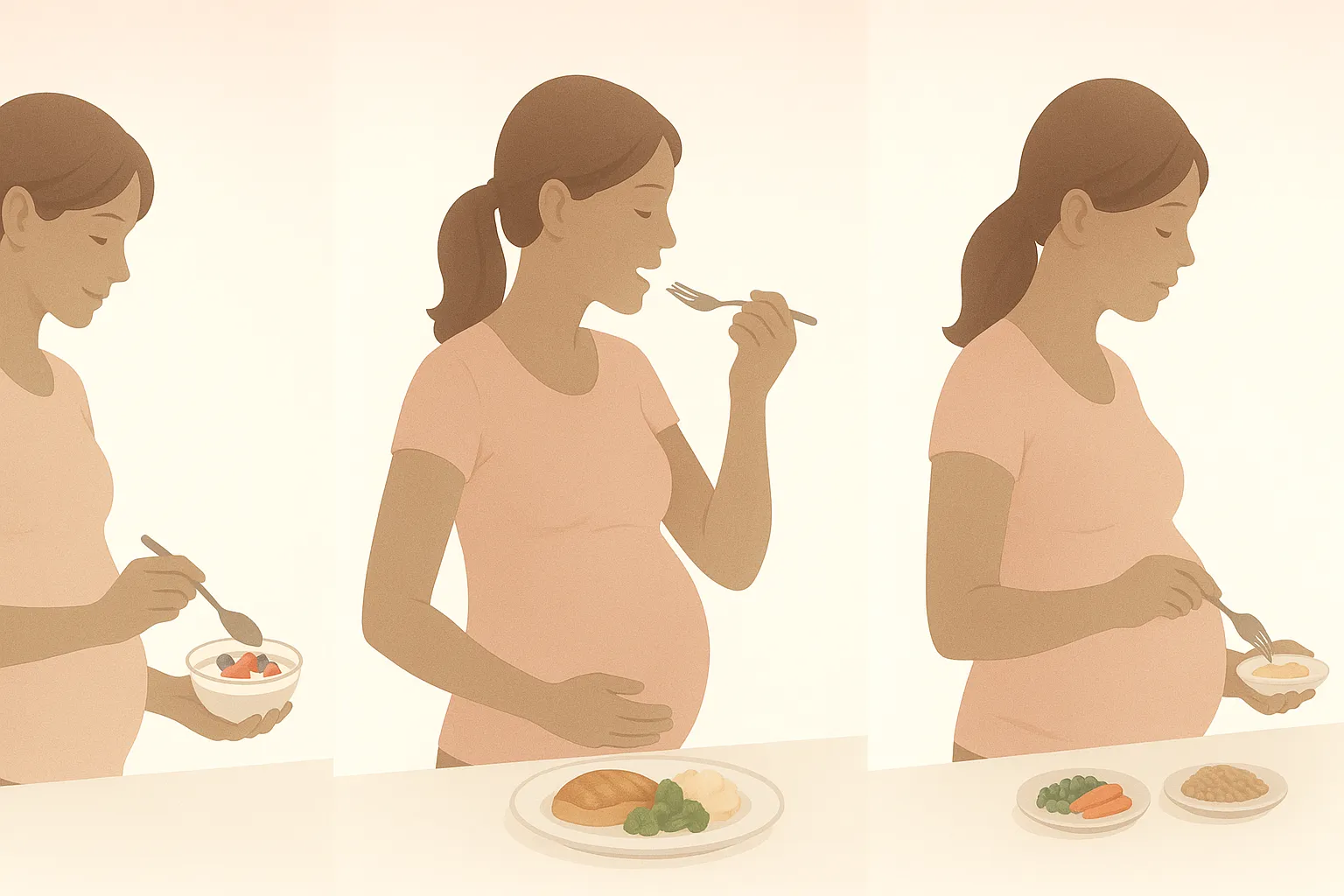 Protein needs evolve throughout pregnancy as baby grows
Protein needs evolve throughout pregnancy as baby grows

What Happens When Protein Intake Falls Short?
The consequences of protein deficiency during pregnancy extend far beyond just the nine months. Research on maternal protein deficiency has uncovered troubling long-term effects that can impact children well into adulthood.
Low protein intake can cause embryonic losses, growth restriction in the uterus, and reduced postnatal growth. These effects stem from deficiency in specific amino acids important for cell function. Studies using animal models found that inadequate protein consumption activates stress pathways in maternal muscles, and these genetic changes may transfer through the placenta to the fetus, potentially causing low birth weight and stunted growth.
Babies born to mothers with insufficient protein intake during pregnancy tend to be underweight and may develop kidney problems. Research discovered that maternal protein restriction changed the expression of genes involved in kidney development as early as the 17th day of gestation in rat models, with similar implications for humans. The study showed a 28% reduction in nephron development - the filtering units of kidneys - when mothers consumed low-protein diets during pregnancy.
The impacts aren't limited to physical development. Studies examining protein intake during early pregnancy found associations between low maternal protein intake and higher risks of child developmental delay at age three. This research, analyzing over 77,000 mother-child pairs, demonstrated that protein nutrition in early pregnancy affects not just fetal growth but also postnatal neurodevelopment.
Research on Chinese pregnant women with low protein intake found that higher dietary protein, particularly from animal and dairy sources, was associated with higher birth weight and lower risks of low birth weight, small for gestational age babies, and intrauterine growth restriction. This large-scale study of over 7,000 women provided clear evidence of protein's importance across populations.
Perhaps most concerning, animal studies show that fetal exposure to maternal low-protein diets induces hypertension in offspring. This phenomenon appears early in life and persists, suggesting that inadequate protein during pregnancy can program cardiovascular problems that last a lifetime. Research found that pups from protein-restricted mothers became hypertensive by just ten weeks after birth.
The message is clear: protein deficiency during pregnancy isn't just about immediate growth - it's about setting the foundation for lifelong health.
Trimester-by-Trimester Protein Requirements
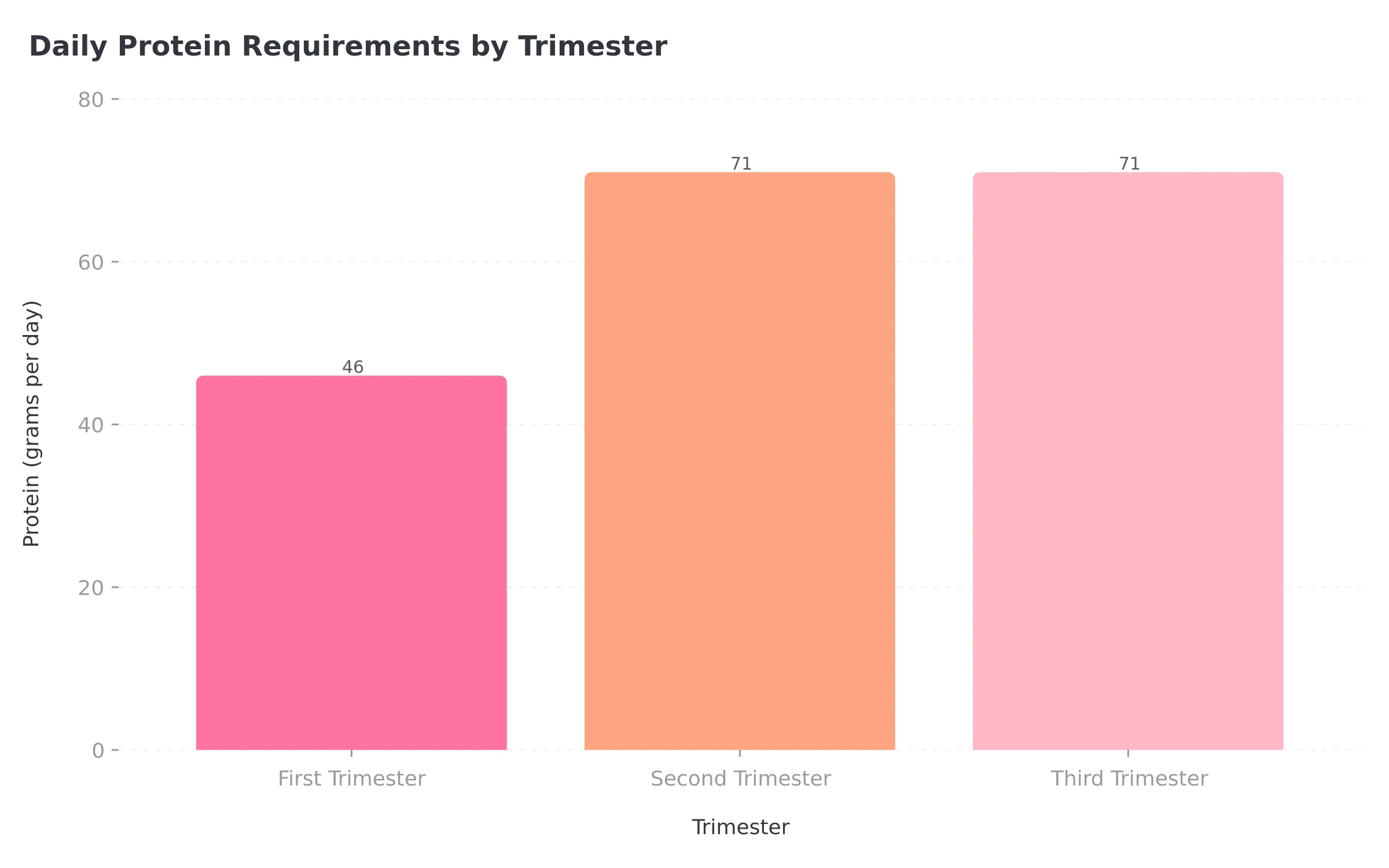 Figure 1: Protein requirements increase significantly from first to second trimester
Figure 1: Protein requirements increase significantly from first to second trimester
First Trimester: Foundation Building (Weeks 1-12)
The first trimester often feels like a nutritional battlefield. Morning sickness, food aversions, and fatigue make eating challenging. Yet this period lays the foundation for everything that follows.
Protein Requirement: 46 grams per day (similar to pre-pregnancy needs)
During the first trimester, protein requirements remain relatively stable. The embryo is tiny, and major protein deposition hasn't begun. However, this doesn't mean protein isn't important. This phase involves crucial cell differentiation and organ formation. Every major organ system begins development during these first twelve weeks.
Many women struggle to meet even this moderate requirement due to nausea and food aversions. Research shows that while first trimester protein needs are lower, meeting them consistently supports early embryonic development and helps mothers maintain their own health during this challenging time.
Common Challenges:
- Morning sickness making protein-rich foods unappetizing
- Food aversions to meat, fish, and eggs
- Fatigue reducing motivation to prepare protein-rich meals
- Metallic taste in mouth affecting food enjoyment
- Heightened sense of smell triggering nausea from cooking odors
Smart Protein Strategies:
- Choose cold protein sources if hot foods trigger nausea (yogurt, cold milk, paneer)
- Eat small amounts frequently rather than large meals
- Try bland protein sources like khichdi with moong dal
- Keep roasted chana or nuts handy for easy snacking
- Drink protein smoothies if solid foods are difficult
- Use NutriScan's Meal Scan feature to track intake by photographing meals - no manual logging needed
- Ask NutriBites quick questions about protein sources that won't trigger nausea
Second Trimester: Growth Acceleration (Weeks 13-27)
The second trimester brings welcome relief from first trimester symptoms. Energy returns, appetite improves, and the baby begins growing rapidly. This phase demands significantly more protein.
Protein Requirement: 71 grams per day (1.1 grams per kilogram body weight). Need help calculating your exact needs? Try our Online Macro Calculator for personalized recommendations.
Research indicates that protein requirements jump substantially in the second trimester. The baby's organs are developing rapidly, and the placenta continues growing. Maternal blood volume expansion accelerates, all requiring increased protein.
Studies found that 12.1% of women in the second trimester consume less protein than needed. This deficiency during such a critical growth phase can have lasting consequences on fetal development.
What's Happening:
- Baby's brain develops approximately 250,000 neurons per minute
- Bones begin hardening and muscles strengthen
- Skin layers form and fingerprints develop
- Organs mature and begin practicing functions
- The baby grows from roughly 3 inches to 14 inches long
- Weight increases from about 1 ounce to 2 pounds
Protein Distribution Tips:
- Aim for 20-25 grams of protein at each main meal
- Include protein in every snack
- Combine plant proteins for complete amino acid profiles
- Track intake using NutriScan's Insights feature to monitor your progress and ensure adequacy
- Use voice-powered AI assistant Monika (Premium feature) for personalized nutrition guidance
Sample Day:
- Breakfast: 2 eggs with whole wheat toast (14g protein)
- Mid-morning: Greek yogurt with almonds (15g protein)
- Lunch: Dal with rice and paneer sabzi (25g protein)
- Evening: Roasted chana (7g protein)
- Dinner: Grilled chicken with vegetables (25g protein)
- Bedtime: Milk (8g protein)
- Total: 94g protein
 Enjoying healthy, protein-rich meals throughout pregnancy
Enjoying healthy, protein-rich meals throughout pregnancy
Third Trimester: Final Growth Sprint (Weeks 28-40)
The third trimester represents the home stretch. The baby gains most of their birth weight during these final weeks. Protein demands peak, yet many women find eating challenging due to stomach compression.
Protein Requirement: 71 grams per day (minimum), with some research suggesting up to 1.52 grams per kilogram body weight
Recent research using advanced testing methods found that protein requirements during late pregnancy (around 36 weeks) average 1.52 grams per kilogram body weight - substantially higher than current official recommendations. This research suggests pregnant women need approximately 14-18% of total energy from protein.
Studies show that 12.8% of women in the third trimester have inadequate protein intake. Given the critical nature of this period, this statistic is concerning.
Critical Third Trimester Developments:
- Baby's brain triples in weight
- Fat accumulation for temperature regulation after birth
- Lung maturation for breathing
- Immune system development
- Final organ maturation
- Baby gains approximately half a pound per week
Third Trimester Protein Challenges:
- Limited stomach capacity due to baby's size
- Heartburn and digestive discomfort
- Fatigue making meal preparation difficult
- Swelling and water retention
- Increased bathroom trips disrupting meal timing
Solutions:
- Eat smaller, more frequent meals (6-7 times daily)
- Focus on protein-dense foods requiring less volume
- Choose easily digestible proteins
- Use NutriScan's Meal Scan feature to track meals without manual logging - just click a picture
- Keep high-protein snacks readily available
- Consider Premium Diet Plan feature for personalized pregnancy meal planning
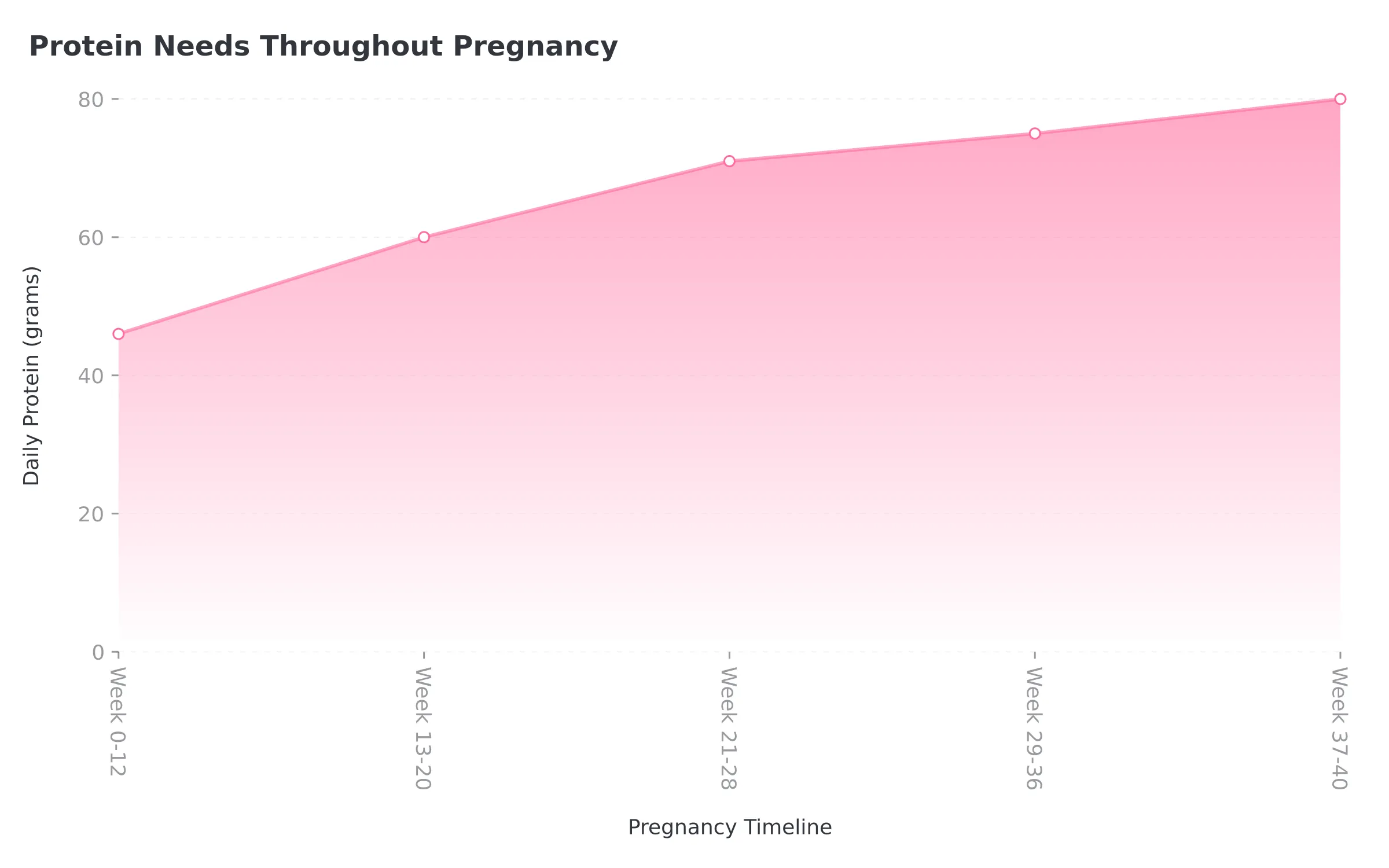 Figure 2: Protein needs increase throughout pregnancy, peaking in the third trimester
Figure 2: Protein needs increase throughout pregnancy, peaking in the third trimester
Best Protein Sources for Pregnant Women
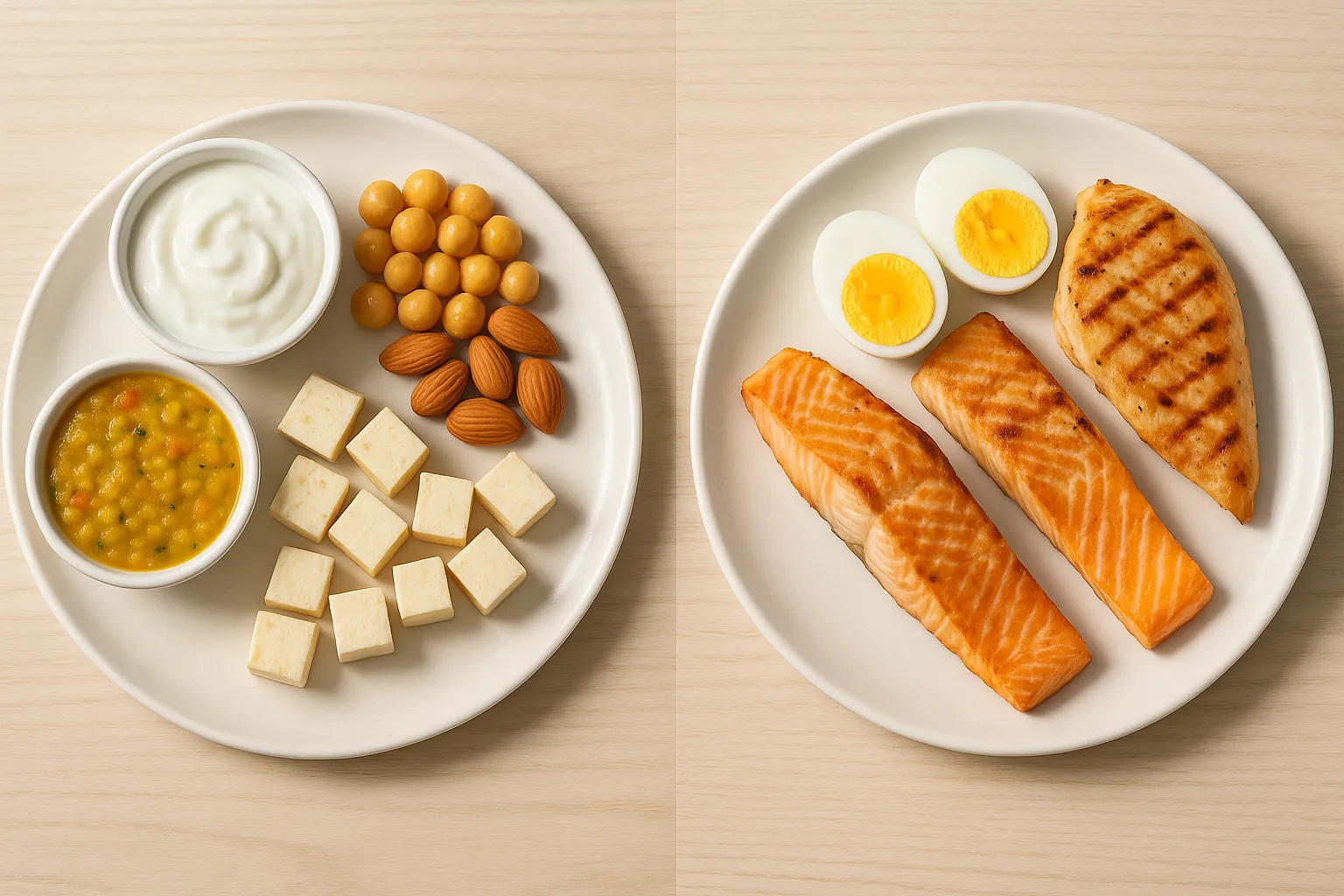 Diverse protein options for every dietary preference
Diverse protein options for every dietary preference
For Non-Vegetarian Moms
Lean Meats (25-30g protein per 100g): Chicken, turkey, and lean beef provide high-quality protein with essential nutrients like iron and vitamin B12. These nutrients support red blood cell production and nervous system development. Lean meats offer complete proteins with all essential amino acids needed for fetal growth.
Fish and Seafood (20-25g protein per 100g): Salmon, sardines, and prawns offer protein plus omega-3 fatty acids crucial for brain and eye development. Research emphasizes the importance of omega-3, particularly DHA, with demand highest in the third trimester. Avoid high-mercury fish like shark, swordfish, king mackerel, and tilefish.
Eggs (6g protein per egg): Eggs are protein powerhouses containing all essential amino acids plus choline, vital for brain development. They're affordable, versatile, and easy to prepare in multiple ways - scrambled, boiled, poached, or in omelets.
For Vegetarian and Vegan Moms
Dairy Products:
- Milk (8g protein per cup): Also provides calcium and vitamin D
- Greek yogurt (10g protein per 100g): Contains probiotics supporting digestive health
- Paneer (18g protein per 100g): Traditional Indian favorite, rich in calcium
- Cheese: Various types offering 20-25g protein per 100g
- Hung curd: Concentrated protein source with probiotic benefits
Legumes and Lentils:
- Moong dal, masoor dal, toor dal (18g protein per cup cooked): Daily staples providing iron and folate
- Chickpeas/chana (15g protein per 100g): Great in curries, salads, or roasted snacks
- Rajma/kidney beans (15g protein per cup): Comfort food with good protein
- Black chana (15g protein per 100g): Excellent for snacking
- Whole mung beans: Can be sprouted for enhanced nutrition
Soy Products:
- Tofu (8g protein per 100g): Contains all essential amino acids, rich in iron and calcium
- Soy milk (7g protein per cup): Good dairy alternative
- Soy chunks (52g protein per 100g dry): Concentrated protein source
- Tempeh: Fermented soy with additional nutritional benefits
Nuts and Seeds:
- Almonds (6g protein per ounce): Also provide vitamin E and healthy fats
- Peanuts (7g protein per ounce): Affordable protein source
- Chia seeds (5g protein per 2 tablespoons): Plus omega-3 and fiber
- Pumpkin seeds (9g protein per ounce): Rich in zinc and magnesium
- Flaxseeds: Ground flaxseeds provide omega-3 along with protein
- Walnuts: Brain-healthy fats combined with protein
Whole Grains:
- Quinoa (8g protein per cup cooked): Complete protein with all essential amino acids
- Oats (6g protein per half cup): Good breakfast option
- Millets (bajra, ragi) (6-8g protein per cup): Traditional grains with protein, iron, and calcium
- Brown rice: Provides some protein along with fiber
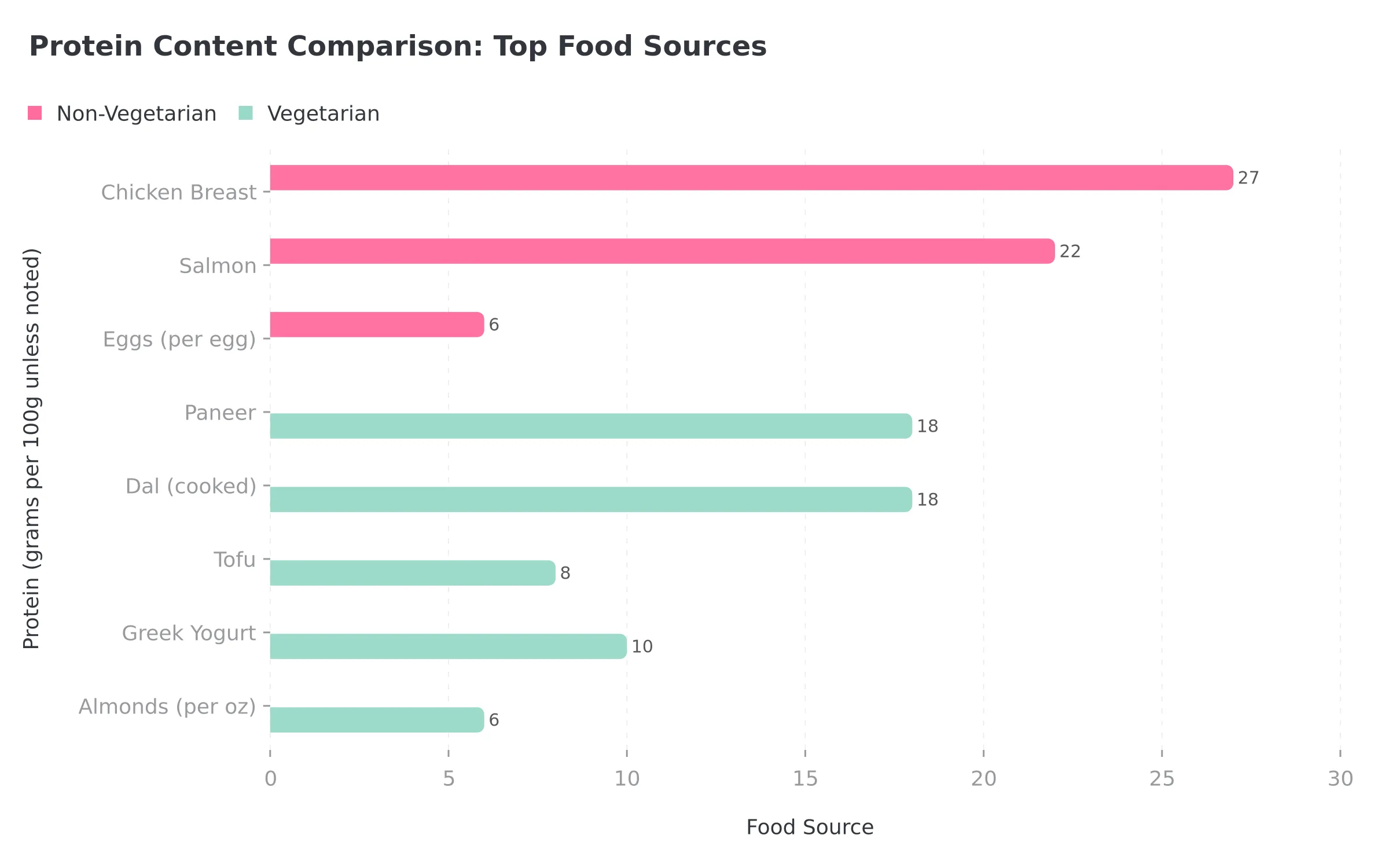 Figure 3: Protein content comparison between vegetarian and non-vegetarian sources
Figure 3: Protein content comparison between vegetarian and non-vegetarian sources
Seven Practical Tips for Meeting Protein Goals
Tip 1: Use Technology to Track Without Stress
Modern apps like NutriScan make protein tracking effortless. Instead of manual logging, simply click a picture of meals. The app analyzes nutritional content including protein, providing instant feedback. This visual approach removes the burden of constant calculation while ensuring adequate intake. The app tracks daily goals, showing progress throughout pregnancy.
For quick questions about protein sources or meal ideas, the NutriBites feature provides instant AI-powered answers. No need to search the internet or wait for doctor appointments - get reliable nutrition information immediately. Premium members can also access Monika, the voice-powered AI nutritionist, for hands-free guidance while cooking or eating.
Tip 2: Protein-Load Your Breakfast
Starting the day with 20-25 grams of protein stabilizes blood sugar, reduces morning sickness in some women, and ensures strong nutritional foundation. Options include:
- Moong dal dosa with coconut chutney
- Scrambled eggs with whole wheat toast
- Greek yogurt parfait with nuts and fruits
- Paneer paratha with curd
- Oatmeal cooked in milk with almonds
- Protein smoothie with banana, yogurt, and nut butter
Tip 3: Combine Plant Proteins for Complete Amino Acids
Plant proteins often lack one or more essential amino acids. Combining different sources creates complete proteins:
- Dal with rice: Classic combination providing all essential amino acids
- Hummus with whole wheat pita
- Peanut butter on whole grain bread
- Bean and corn salad
- Lentil and quinoa bowl
- Tofu with brown rice
Tip 4: Keep High-Protein Snacks Accessible
Pregnancy hunger strikes unexpectedly. Stock these protein-rich snacks:
- Roasted chana or peanuts
- Hard-boiled eggs
- String cheese or paneer cubes
- Trail mix with nuts and seeds
- Protein smoothies in fridge
- Yogurt cups
- Protein bars (check sugar content)
- Edamame pods
Tip 5: Add Protein to Every Meal and Snack
Rather than focusing protein at dinner, distribute throughout the day. Add:
- Nuts to breakfast cereal
- Paneer to vegetable dishes
- Boiled egg to salads
- Milk or buttermilk with lunch
- Dal or beans to soups
- Greek yogurt to smoothies
- Chia seeds to oatmeal or yogurt
Tip 6: Prepare Protein-Rich Foods in Bulk
Batch cooking saves energy and ensures protein availability when tired:
- Cook large pot of dal, freeze portions
- Hard-boil dozen eggs, refrigerate
- Grill chicken breasts for the week
- Prepare hummus or paneer spreads
- Soak and cook beans in bulk
- Make protein smoothie packs for freezer
- Prep marinated tofu for quick cooking
Tip 7: Consult Healthcare Provider and Track Progress
Individual protein needs vary based on weight, activity level, and whether carrying multiples. Doctors can provide personalized recommendations. Using NutriScan's Meal Timeline feature, women can share their eating patterns with healthcare providers, enabling better guidance. The app's pregnancy goal option tracks nutrition specifically for expecting mothers.
For those on Premium plans, the personalized Diet Plan feature creates customized meal plans based on the pregnancy goal, ensuring optimal nutrition throughout all three trimesters. This takes the guesswork out of meal planning and ensures balanced protein intake.
![]() Track protein intake effortlessly with NutriScan's photo-based meal logging
Track protein intake effortlessly with NutriScan's photo-based meal logging

Step-by-Step Guide to Optimizing Protein Intake
Step 1: Calculate Your Personal Protein Needs
Start by determining individual requirements (or use our Online Macro Calculator for instant calculations):
- Find current weight in kilograms (divide pounds by 2.2)
- First trimester: Multiply weight by 0.8g
- Second and third trimesters: Multiply weight by 1.1g (or 1.5g based on recent research)
- Add 10-15% buffer for individual variation
- Consider activity level adjustments
Example: 60kg woman in second trimester needs approximately 66g protein minimum (60 x 1.1), ideally aiming for 75-90g for optimal nutrition.
Step 2: Audit Current Intake
Before making changes, understand current habits:
- Use NutriScan's Meal Scan feature to photograph all meals for three days
- Review protein content in each meal using the app's analysis
- Identify gaps in intake throughout the day
- Note times when protein is lowest
- Recognize patterns (skipping breakfast, light lunches, heavy dinners)
- Assess variety of protein sources consumed
This audit reveals patterns that might not be obvious otherwise. Many women discover they're eating adequate protein at dinner but missing opportunities earlier in the day.
Step 3: Create a Personalized Protein Plan
Based on audit findings:
- Set specific protein targets for each meal (breakfast: 20g, lunch: 25g, dinner: 25g)
- Choose favorite protein sources from each category
- Plan weekly menu including variety to prevent boredom
- Prepare grocery list with all protein foods
- Schedule batch cooking sessions for the week
- Set app reminders for meals and snacks
- Identify backup options for days when cooking isn't possible
- Plan restaurant choices with high-protein options
For Premium users, the Diet Plan feature can automate this process, creating personalized meal plans that meet protein goals while accommodating food preferences and any restrictions.
Step 4: Implement Gradually
Don't overhaul everything overnight:
- Week 1: Focus on protein-rich breakfast establishment
- Week 2: Add protein to mid-morning and afternoon snacks
- Week 3: Increase lunch protein to target level
- Week 4: Optimize dinner and evening snack
- Ongoing: Fine-tune based on appetite and preferences
- Adjust for changing trimester needs
Gradual implementation prevents overwhelm and makes changes sustainable long-term.
Step 5: Monitor and Adjust
Regular monitoring ensures goals are met:
- Check NutriScan app daily for protein intake
- Note energy levels and how you feel
- Monitor weight gain patterns
- Discuss findings with healthcare provider at appointments
- Adjust portions if struggling to meet targets
- Try new protein sources if bored with routine
- Use NutriBites to ask questions when uncertain
- Share meal timeline with doctor for professional feedback
The app's tracking features make monitoring simple and visual, removing stress from the process. Seeing daily progress provides motivation to continue making good choices.
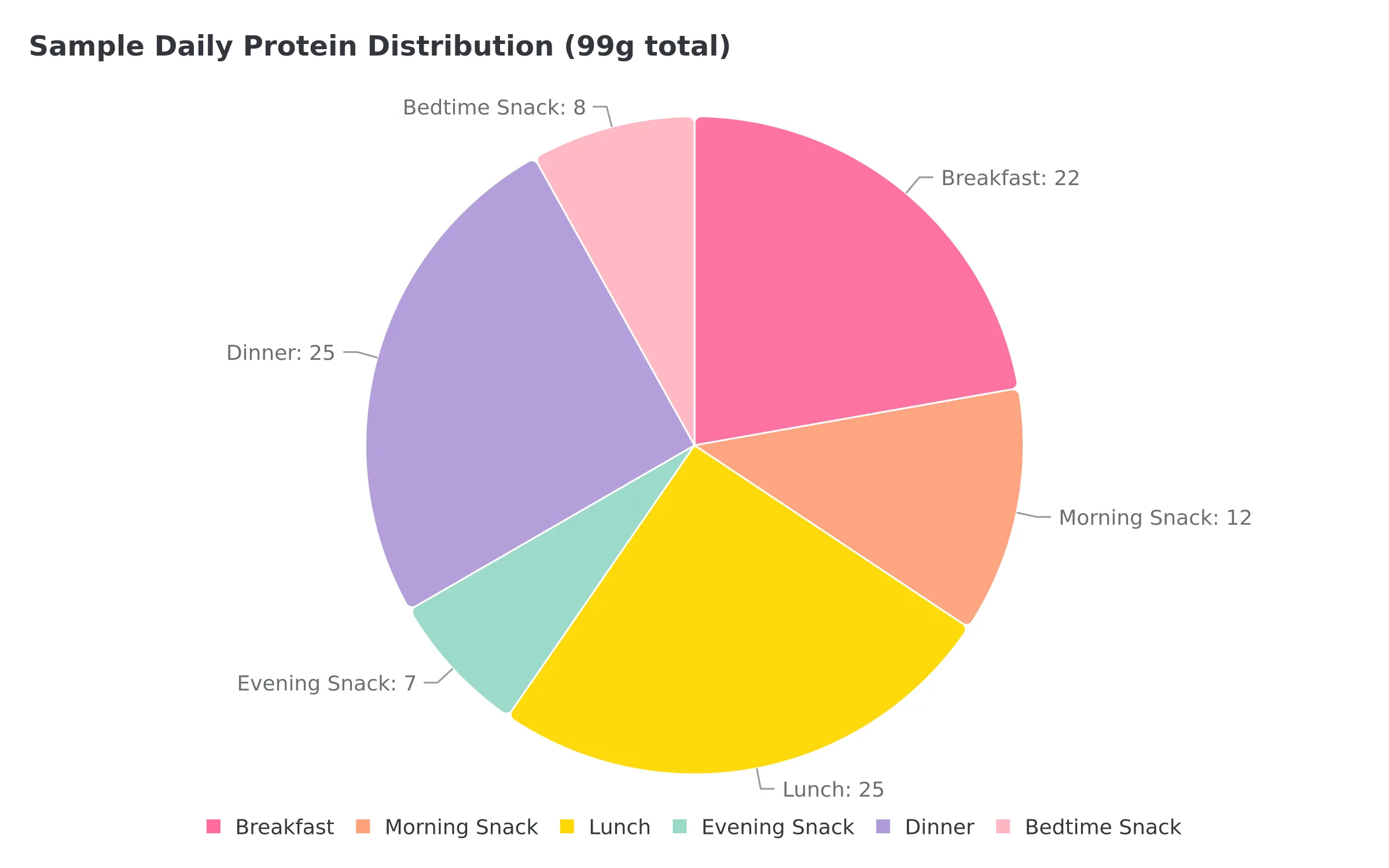 Figure 4: Ideal protein distribution throughout the day for pregnant women
Figure 4: Ideal protein distribution throughout the day for pregnant women
What Research Says About Protein and Pregnancy Outcomes
Recent studies provide clear evidence of protein's importance:
Research analyzing data from over 77,000 mother-child pairs found that severely low protein intake (less than 9.39% of total energy) during early pregnancy was associated with higher risk of child developmental delay at age three. This large-scale study highlights long-term consequences of inadequate protein that extend well beyond the pregnancy period.
Another study examining 7,310 pregnant women in China found that higher dietary protein intake, particularly from animal and dairy sources, was associated with higher birth weight and lower risks of low birth weight, small for gestational age, and intrauterine growth restriction. The research emphasized that both the quantity and quality of protein matter.
Research on protein requirements using advanced testing methods determined that pregnant women need approximately 1.2 grams per kilogram body weight during early pregnancy (around 16 weeks) and 1.52 grams per kilogram during late pregnancy (around 36 weeks). These values are substantially higher than current official recommendations, suggesting many pregnant women may not be getting enough protein.
Studies on maternal protein deficiency show it can cause embryonic losses, growth restriction, and reduced postnatal growth due to specific amino acid deficiencies important for cell function. The research also found that both inadequate and excessive protein intake can be harmful, emphasizing the importance of balanced nutrition within recommended ranges.
Animal studies demonstrate that maternal protein restriction during pregnancy causes abnormal brain development in offspring, with implications extending into childhood and beyond. Research found that protein deficiency activated stress pathways in maternal tissues, and these changes transferred to the fetus through epigenetic mechanisms.
Frequently Asked Questions
Q1: Can vegetarians and vegans get enough protein during pregnancy?
A: Yes, vegetarians and vegans can absolutely meet protein requirements during pregnancy with proper planning. Plant-based protein sources like lentils, beans, chickpeas, tofu, nuts, seeds, and whole grains provide adequate protein when consumed in sufficient quantities and variety. The key is combining different plant proteins to ensure all essential amino acids are obtained. For example, dal with rice creates a complete protein. Dairy products (for vegetarians) like milk, yogurt, and paneer significantly boost protein intake. Research shows that vegetarians consuming foods like yogurt, chia seeds, quinoa, beans, and eggs easily meet the 71-gram daily recommendation. Vegans should focus on tofu, lentils, soy milk, nut butters, and fortified foods. Using NutriScan app helps vegetarian and vegan moms track intake and ensure they're meeting protein goals through plant-based sources. The app's NutriBites feature can answer specific questions about combining plant proteins for optimal nutrition. For personalized guidance, Premium members can use the Diet Plan feature to get customized vegetarian or vegan meal plans designed specifically for pregnancy.
Q2: What if I can't stomach protein-rich foods due to morning sickness?
A: Morning sickness makes consuming traditional protein sources difficult for many women. Try these strategies: Choose cold protein foods (yogurt, cold milk, smoothies) as hot foods often trigger nausea. Eat small amounts throughout the day rather than large meals. Bland proteins like khichdi with moong dal may be better tolerated. Drink protein instead of eating it through smoothies or milk-based drinks. Keep crackers with nut butter nearby for quick protein. Try different protein sources to find what works - if chicken makes you nauseous, try paneer or dal. Protein powders (after consulting your doctor) can supplement when solid foods are impossible. Remember that first trimester protein requirements are lower (46g), so even small amounts help. Use ginger tea or lemon water to ease nausea before meals. Most importantly, do your best and know that morning sickness typically improves in the second trimester when protein needs increase. The NutriScan app helps identify which foods you're successfully eating, so you can focus on those during difficult periods. Ask NutriBites for nausea-friendly protein ideas specific to your situation.
Q3: Is it possible to eat too much protein during pregnancy?
A: Yes, excessive protein intake can be problematic. Research shows that very high maternal protein intake can result in growth restriction and embryonic complications due to amino acid excesses and toxicity from ammonia and other compounds generated from amino acid breakdown. However, this typically occurs only with extremely high protein diets (significantly above 100g daily for most women). Most pregnant women don't need to worry about eating too much protein if following reasonable guidelines (71-100g daily). The concern is more relevant for those taking multiple protein supplements without medical supervision. Balance is key - protein should comprise roughly 15-20% of total daily calories. Eating varied protein sources and not relying solely on supplements helps maintain healthy balance. Focus on meeting recommended amounts (71g in second and third trimesters) through whole foods. If concerned about intake levels, discuss with healthcare provider who can assess based on individual circumstances. NutriScan app helps monitor daily protein intake, preventing both deficiency and excess. The app provides feedback if intake seems too high or too low, helping maintain optimal range.
Q4: Do protein requirements change if I'm carrying twins or multiples?
A: Yes, protein requirements increase significantly with twins or multiples. Women pregnant with twins need approximately 100 grams of protein daily - about 30 grams more than singleton pregnancies. Triplets require even more, with recommendations around 125-150g daily. This increased demand supports growth of multiple babies, larger placenta(s), and greater maternal blood volume expansion. Meeting these higher requirements can be challenging, especially with twins causing more stomach compression later in pregnancy. Strategies include: eating smaller, more frequent meals (6-8 times daily), choosing protein-dense foods that provide more protein in less volume, incorporating protein at every meal and snack, considering protein smoothies that are easier to consume, and working with a nutritionist for personalized guidance. Using tracking apps like NutriScan becomes even more important to ensure adequate intake when requirements are higher. Some doctors recommend protein supplements for multiple pregnancies, but always consult your healthcare provider before adding supplements. Regular monitoring helps ensure both mothers and babies receive adequate nutrition for healthy development. The Premium Diet Plan feature in NutriScan can accommodate multiple pregnancy requirements with customized meal planning.
Q5: How can I tell if I'm getting enough protein during pregnancy?
A: Several signs indicate adequate protein intake: sustained energy levels throughout the day, healthy weight gain according to trimester guidelines, normal blood test results (protein levels, hemoglobin), minimal muscle loss, good skin elasticity, strong hair and nails, and healthy fetal growth as measured by ultrasounds. Signs of insufficient protein include: constant fatigue not explained by normal pregnancy tiredness, slow wound healing, frequent infections indicating compromised immune function, swelling beyond normal pregnancy edema, loss of muscle mass, brittle hair and nails, anemia despite iron supplementation, and low birth weight or growth restriction flagged by doctor. The most reliable way to ensure adequate intake is tracking nutrition. NutriScan app makes this simple - photograph meals, and the app calculates protein content automatically. This removes guesswork and provides daily feedback showing whether intake meets goals. Regular prenatal checkups with blood tests help identify deficiencies early. Discuss any concerns with your healthcare provider who can assess whether intake meets your individual needs based on weight, activity level, and pregnancy progression. The app's meal timeline can be shared with doctors for professional assessment and recommendations.
Conclusion: Your Protein, Your Baby's Future
Protein requirements during pregnancy evolve across trimesters, starting at 46 grams in the first trimester and increasing to at least 71 grams in the second and third trimesters. Recent research suggests even higher amounts may be beneficial, particularly in late pregnancy when fetal growth accelerates most rapidly.
The key takeaways are: protein is essential for every aspect of fetal development from brain cells to organ formation; inadequate intake has both immediate and long-term consequences for child health and development; both vegetarian and non-vegetarian diets can meet protein needs with planning; tracking intake helps ensure adequacy without stress; and individual needs vary based on weight, activity, and whether carrying multiples.
Meeting protein goals doesn't require perfect eating every day. It requires awareness, planning, and consistency. Small steps like protein-rich breakfasts, smart snacking throughout the day, and using tracking tools like NutriScan make the difference between barely adequate and truly nourishing nutrition.
Every protein-rich meal contributes to building a healthy baby. Every mindful choice today supports their development tomorrow and potentially their health for decades to come. With knowledge, planning, and tools like NutriScan to simplify tracking, pregnant women can confidently nourish both themselves and their growing babies throughout this amazing journey.
The NutriScan app's pregnancy-specific features - including the Pregnancy goal option, NutriBites for instant nutrition answers, meal photo tracking, and Premium Diet Plan - provide comprehensive support throughout all three trimesters. These tools remove complexity from nutrition management, allowing mothers to focus on what matters most: enjoying pregnancy and preparing for their baby's arrival.
Ready to Track Your Pregnancy Nutrition?
Download NutriScan today and start tracking your protein intake effortlessly. Simply photograph your meals and let the app do the work. Get personalized insights, ask nutrition questions anytime with NutriBites, and access Premium features like customized meal plans designed specifically for pregnancy.
Download NutriScan Now and take the guesswork out of pregnancy nutrition!
 ChatGPT
ChatGPT  Claude
Claude  AI Mode
AI Mode  Perplexity
Perplexity 